TFT based near-sensor process techniques
Thin-film materials and technologies are quite important for large-area flexible electronics , whose future applications spread in healthcare, the automotive industry, human–machine interfaces, mobile devices, and other environments [1].
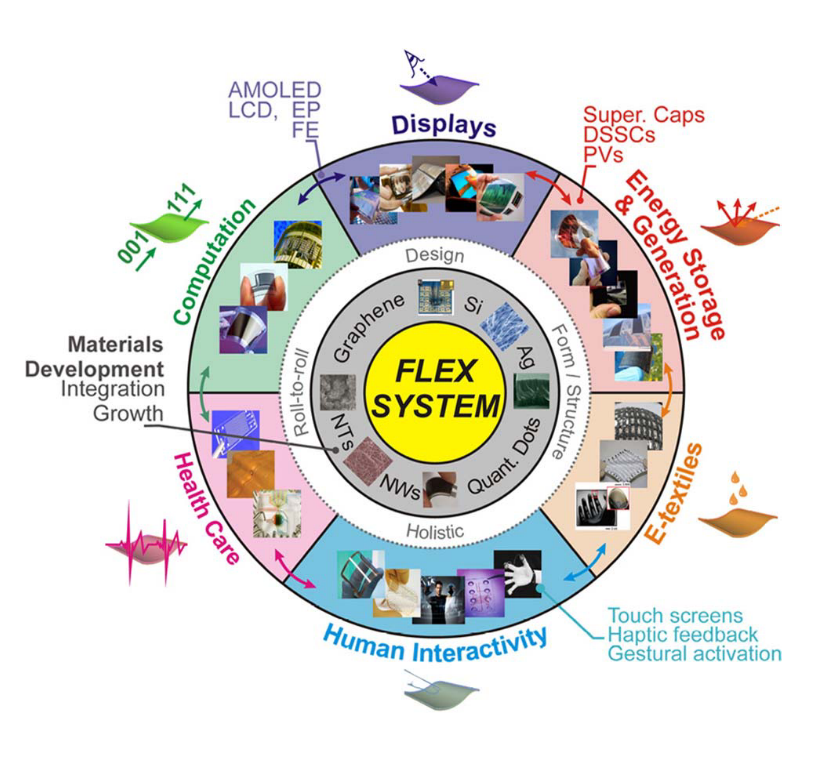
The thin-film-transistor (TFT) technique makes it possible for building integrated circuits on flexible substrates such as glass or plastic. Thus the signal processing circuits can be fabricated close to sensor arrays, leading to higher throughput, lower latency and power consumption. However, the limited computational capability of TFT circuits as well as high variability and high density of process defects weakens the reliability of whole system.
To resolve this question, several studies have developed methods combine the advantages of TFT circuits and traditional silicon CMOS circuits.
[2] realizes embedded weak TFT classifiers to reduce high-dimensional sensor data from a-Si photoconductors to a small number of weak-classifier decisions, the decisions are then combined in CMOS circuits to achieve a high classification accuracy.
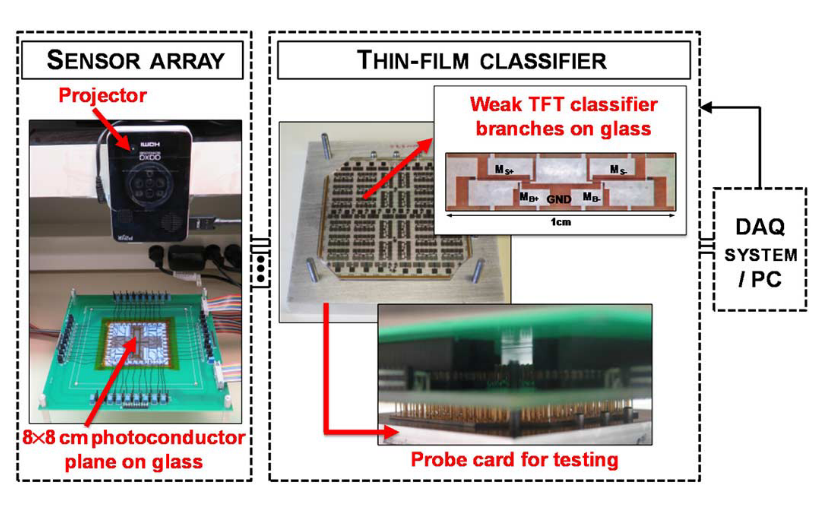
[3] takes advantage of the sparse statistical characteristic of human body signals, use flexible circuitry to implement a CS encoder and decode the compressed signal in the silicon side. In this way, the system achieves a balance between robustness and flexibility.
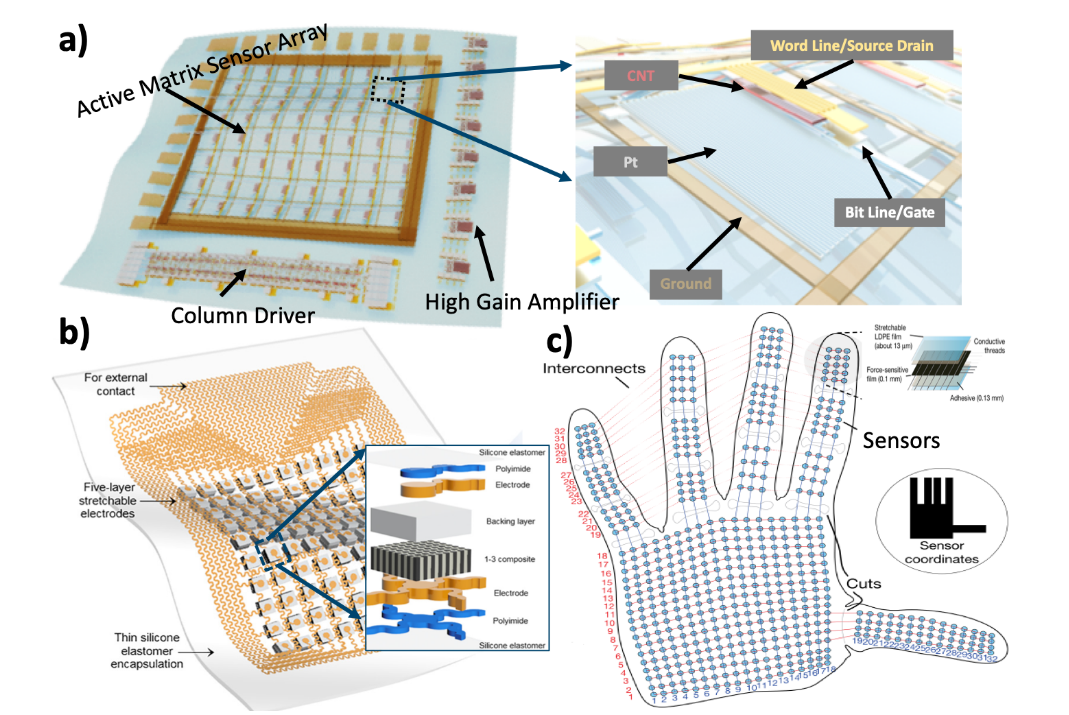
IGZO based CiM techniques
CiM paradigms are offering great opportunities to thin-film transistors (TFTs). TFT devices have lots of unique advantages, including flexibility, transparency, large-area integration, and low-cost fabrication. In recent years, TFT devices are not only showing the possibility of in-memory computing, but also widely used in large-area sensing , making it possible to combine the CiM structure with a large-area sensor array to further decrease the data movement.
IGZO TFT has relatively higher mobility and a higher on-off ratio. Typical leakage current of IGZO TFT is quite low. Because of this characteristic, the IGZO TFT DRAM can have extremely low leakage, allowing retention time up to days.
[4] proposed a CiM array which can process MAC operations. Based on the quadratic Ids-Vgs relationship in saturation region, the multiplication term can be obtained by comparing the output current of 4 cells.
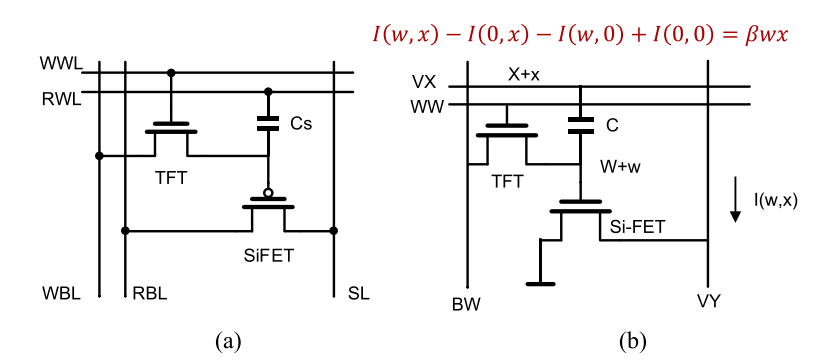
[5] simplify the scheme of [4], uses only 2 cells to realize the multiplication based on Ids-Vgs,Vds relationship in linear region.
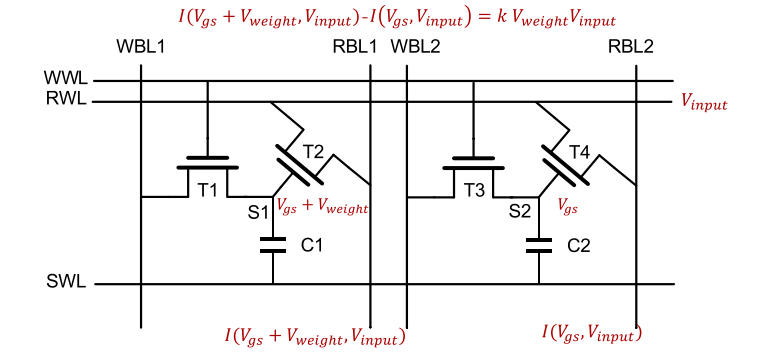
However, the effectiveness of methods mentioned above highly rely on the correctness of Ids-Vgs,Vds relationship of transistor. What's more, the variation of threshold voltage Vth and technique factor k will defect the multiplication precision severely.
[6] proposed a more robust method: weight is stored as charge on a storage capacitor of IGZO-cell, digital input activations were translated to PW encoded signals on the activation line, This results in a cell charge of Qcell = Icell × Tact which emulates the operation in hardware: weight × activation. Finally, the SAR ADCs capture the differential signal (Vout) at each pair of Sum line.
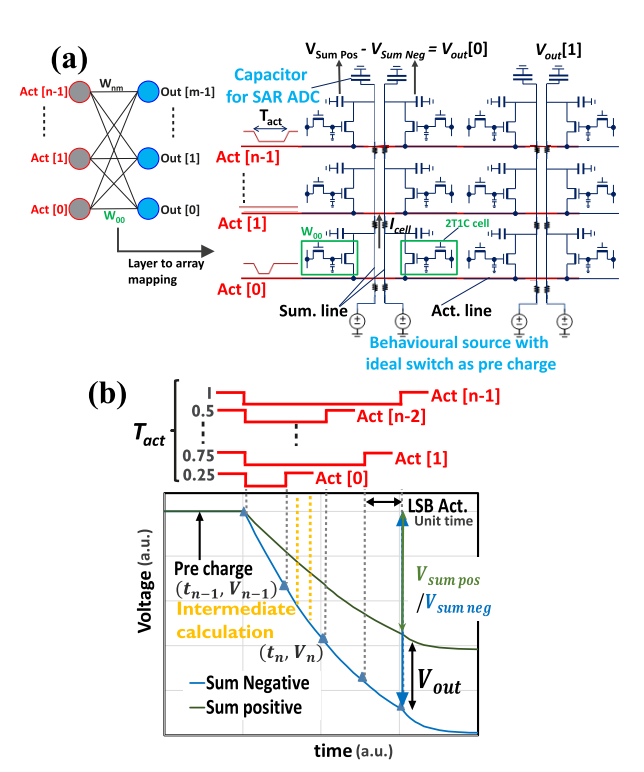
conclusion
IGZO TFT techniques have been broadly used in sensor arrays, building near-sensor signal pre-process TFT circuits can greatly reduce the latency and power consumption of transmitting huge amount of sensor data to processor nodes. The possibility of combining TFT CiM architecture with large-area sensor array can further reduce data movement between memory and processor. The fusion of sensing , storage and computing can minimize the data transmission between different parts of circuits and lead to AIoT devices with lower cost and higher efficiency.
citations
[1] Nathan, A., Ahnood, A., Cole, M. T., Sungsik, L., Suzuki, Y., Hiralal, P., . . . Milne, W. I. (2012). Flexible Electronics: The Next Ubiquitous Platform. Proceedings of the IEEE, 100(Special Centennial Issue), 1486-1517. doi:10.1109/jproc.2012.2190168
[2] A Large-Area Image Sensing and Detection System Based on Embedded Thin-Film Classifiers. (2016). IEEE Journal of Solid-State Circuits, 51(1), 281-290. doi:10.1109/jssc.2015.2489842
[3] L. Shao, T. Lei, T. -C. Huang, Z. Bao and K. -T. Cheng, "Robust Design of Large Area Flexible Electronics via Compressed Sensing," 2020 57th ACM/IEEE Design Automation Conference (DAC), 2020, pp. 1-6, doi: 10.1109/DAC18072.2020.9218570.
[4] Kurokawa, Y., Aoki, T., Kozuma, M., Kimura, H., Kanemura, T., Ando, Y., & Yamazaki, S. (2020). CAAC-IGZO FET/Si-FET hybrid structured analog multiplier and vector-by-matrix multiplier for neural network. Japanese Journal of Applied Physics, 59(SG). doi:10.7567/1347-4065/ab650c
[5] Liu, J., Tang, W., Liu, Y., Yang, H., & Li, X. (2021). Almost-Nonvolatile IGZO-TFT-Based Near-Sensor In-Memory Computing. Paper presented at the 2021 IEEE International Symposium on Circuits and Systems (ISCAS).
[6] Saito, D., Doevenspeck, J., Cosemans, S., Oh, H., Perumkunnil, M., Papistas, I. A., . . . Na, M. H. (2020). IGZO-Based Compute Cell for Analog In-Memory Computing—DTCO Analysis to Enable Ultralow-Power AI at Edge. IEEE Transactions on Electron Devices, 67(11), 4616-4620. doi:10.1109/ted.2020.3025986